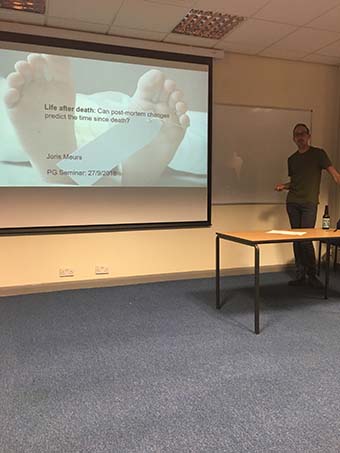The Biomaterials Discovery Programme Grant held their seminar on Thursday 27 September and Joris Meurs gave a talk as part of this series.
 Joris giving his talk.
Joris giving his talk.
Joris’ talk was entitled: “Life after death: can post-mortem biochemical changes predict the time since death?” The post-mortem interval (PMI) is defined as the time between death and investigation of the body. This information can be of value for evidence in criminal prosecution. Standard procedures for PMI estimation as body temperature are not very precise and are influenced by numerous factors. Therefore, attempts have been made to improve the estimation by looking at biochemical changes. While several studies have claimed to have found a suitable biomarker, none of these markers have been investigated thoroughly enough to draw such conclusions. Moreover, none of these biochemical methods are meeting the conditions for scientific evidence in court, making them useless for practical use. However, the field can still easily move forward by implementing research standards and providing sufficient data for assessment for use in practice. Maybe then, there will be a suitable method available.
Joris is a PhD student on the EPSRC funded Programme Grant in Next Generation Biomaterials Discovery in the School of Pharmacy. His main supervisor is Hyun Kim. Joris joined the project in 2017 working on developing mass spectrometry strategies for examination of cellular responses in media and on complex surfaces, mainly associated with RC1 (Moving from 2D to 3D Materials Discovery Methods).
It was a great opportunity to hear Joris speak about his previous work and for the Programme Grant team to get together.
Posted on Monday 1st October 2018